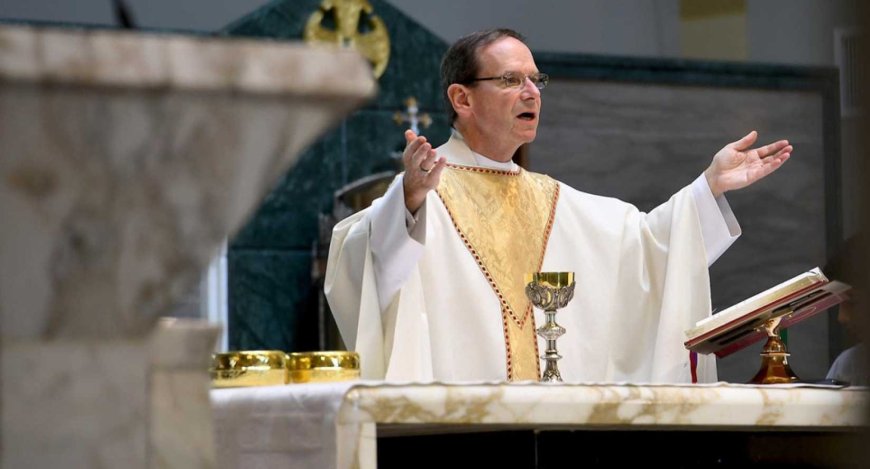Catholic Diocese Sues U.S. Government Over Immigration Policy, Fears Loss of Foreign-Born Priests

The Catholic Diocese of Paterson, New Jersey, along with five of its priests, has filed a lawsuit against U.S. federal agencies, challenging recent changes to immigration procedures that could force many foreign-born clergy to leave the United States. This legal action comes amid growing concerns within religious communities about the impact of prolonged delays in green card processing on their ability to minister effectively to their congregations.
For over a year, religious organizations across the country have been lobbying Congress and the Biden administration to address the sudden shift in how the U.S. government processes green cards for religious workers. The changes have created significant backlogs, threatening the residency status of thousands of foreign-born priests, nuns, and other religious workers who play a crucial role in serving their communities.
The lawsuit, filed in August 2024 in the U.S. District Court in New Jersey, names the Department of State, the Department of Homeland Security, and U.S. Citizenship and Immigration Services as defendants. The Diocese argues that the procedural changes “will cause severe and substantial disruption to the lives and religious freedoms” of both the priests involved and the hundreds of thousands of Catholics they serve.
“Our priests feel we’re doing the best we can,” said Bishop Kevin Sweeney of Paterson, whose diocese includes 107 parishes and serves around 400,000 Catholics in three New Jersey counties. Sweeney emphasized the potential harm to religious communities if these priests are forced to leave, as many parishes are already struggling with a shortage of clergy.
This case marks the first instance of a diocese taking legal action against federal agencies over this issue, according to the diocese's attorney, Raymond Lahoud. However, Lahoud noted that other religious groups are closely watching the situation, as many are equally reliant on foreign-born clergy who have become integral to their U.S. parishes.
The root of the problem lies in the U.S. government’s handling of green card applications under the EB-4 visa category, which is designated for religious workers. Foreign-born clergy typically enter the U.S. on temporary R-1 visas, which allow them to work for up to five years. During this time, religious organizations usually assess whether these individuals are a good fit for their communities and, if so, petition for them to receive permanent residency.
However, in March 2023, the State Department made a significant change by moving certain groups, including unaccompanied minors from Central America, into the same processing queue as religious workers. This decision has drastically increased wait times, with some estimates suggesting that it could take up to 15 years for these green cards to be approved. As a result, many priests and religious workers are facing the prospect of having to leave the U.S. when their current visas expire, with no guarantee of being able to return.
Bishop Mark Seitz of El Paso, Texas, who chairs the U.S. Conference of Catholic Bishops’ Committee on Migration, expressed deep concern about the situation. “It’s so disruptive,” Seitz said, highlighting that some priests in his diocese may be forced to leave, leaving parishes without pastoral leadership. “One is pastor of a large, growing parish. Now I’m supposed to send him away for a year, put him on ice, as it were — and somehow provide Masses?”
The challenges are not limited to the Catholic Church. Other faith groups, including Buddhism, Islam, and Pentecostal Christianity, also rely heavily on foreign-born clergy. These religious workers often provide essential services beyond spiritual guidance, including education, healthcare, and social services, particularly in underserved communities.
Legal experts and advocates are calling for both legislative and administrative fixes. Proposed solutions include allowing clergy to change jobs within their ministry without losing their place in the green card queue and reducing the mandatory time they must spend outside the U.S. after their visa expires before reapplying. However, achieving these changes may prove difficult due to the political sensitivity surrounding immigration reform.
In the meantime, religious organizations are left with few options. Alternative employment visas and green card categories are often more complex and costly to obtain, and many clergy do not meet the requirements, such as demonstrating “prevailing wages.” This is particularly challenging for religious orders that rely on nuns and priests who receive little to no salary.
“This is an untenable situation,” said Lance Conklin, co-chair of the religious workers group within the American Immigration Lawyers Association. “The lawsuit is representative of the way a lot of people feel.”
As religious organizations await potential relief from the courts or the federal government, many are preparing for the possibility of significant disruptions to their ministries. Some are even attempting to bring back religious workers who have already been forced to leave, recognizing the vital role they play in their communities.
“They’re the last safety net of many communities,” said Miguel Naranjo, director of Religious Immigration Services for the Catholic Legal Immigration Network, underscoring the broader social impact of losing these religious workers.
With the outcome of the lawsuit uncertain and no immediate administrative changes in sight, religious organizations across the U.S. are bracing for a challenging period ahead.













































